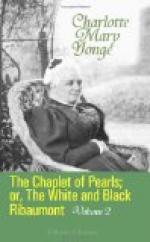‘Madame,’ said Eustacie, gravely, ’I shall never turn any one’s head. There was only one who was obliged to love me, and happily I am nor fair enough to win any one else.’
’Tenez, child. Is this true simplicity? Did Gardon, truly, never tell you of poor Samuel Mace?’
Eustacie’s face expressed such genuine amazement and consternation, that the Duchess could not help touching her on the cheek, and saying, ’Ah! simple as a pensionnaire, as we used to say when no one else was innocent. But it is true, my dear, that to poor Samuel we owe our meeting. I will send him off, the poor fellow, at once to Bourge-le-Roy to preach his three sermons; and when they had driven you a little out of his head, he shall have Mariette there—a good girl, who will make him an excellent wife. She is ugly enough, but it will be all the same to him just then! I will see him, and let him know that I have reasons. He lodges in your house, does he? Then you had better come to see me at once. So will evil tongues best be silenced.
‘But hold,’ the Duchess said, smiling. ’You will think me a foolish old woman, but is it true that you have saved the Pearls of Ribaumont, of which good Canon Froissart tells?’
Eustacie lifted her child on her knee, untied the little gray frock, and showed them fastened beneath, well out of sight. ’I thought my treasures should guard one another,’ she said. ’One I sent as a token to my mother-in-law. For the rest, they are not mine, but hers; her father lent them to me, not gave: so she wears them thus; and anything but HER life should go rather than THEY should.’
‘Hein, a fine guardian for them!’ was all the Duchess said in answer.
CHAPTER XXXV. THE ITALIAN PEDLAR
This caitiff monk for gold did swear,
That by his drugs my rival fair
A saint in heaven should
be.—SCOTT
A grand cavalcade bore the house of Quinet from Montauban—coaches, wagons, outriders, gendarmes—it was a perfect court progress, and so low and cumbrous that it was a whole week in reaching a grand old castle standing on a hill-side among chestnut woods, with an avenue a mile long leading up to it; and battlemented towers fit to stand a siege.
Eustacie was ranked among the Duchess’s gentlewomen. She was so far acknowledged as a lady of birth, that she was usually called Madame Esperance; and though no one was supposed to doubt her being Theodore Gardon’s widow, she was regarded as being a person of rank who had made a misalliance by marrying him. This Madame de Quinet had allowed the household to infer, thinking that the whole bearing of her guest was too unlike that of a Paris bourgeoise not to excite suspicion, but she deemed it wiser to refrain from treating her with either intimacy or distinction that might excite jealousy or suspicion. Even as it was, the consciousness of a secret, or the remnants




